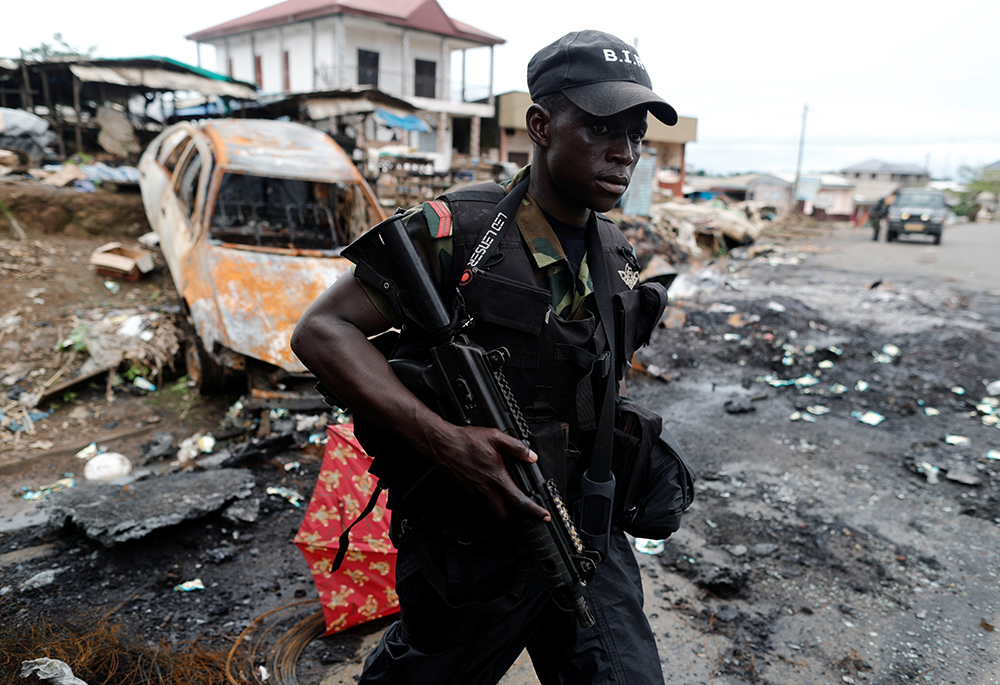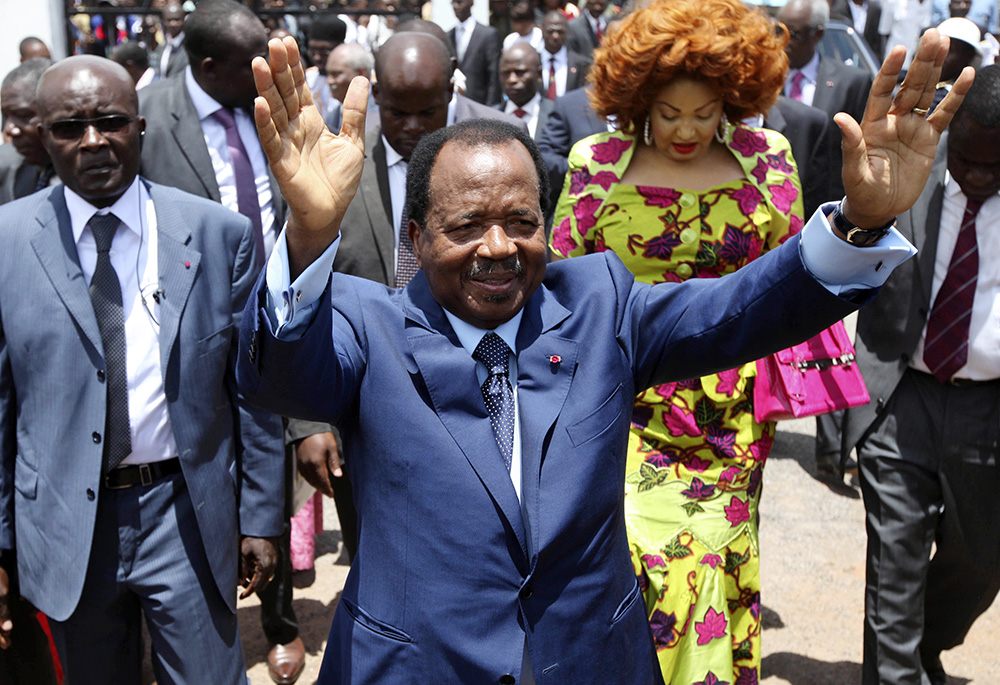
A Cameroonian elite Rapid Intervention Battalion member patrols the abandoned village of Ekona Oct. 4, 2018, in the Anglophone region of Cameroon. (CNS/Reuters/Zohra Bensemra)
Religious leaders in Cameroon's troubled English-speaking regions have welcomed Canada's announcement of a planned dialogue between the government of Cameroon and separatist leaders aimed at resolving a protracted conflict in two western regions of the Central African nation.
But a later statement from the Cameroonian government denying it sought outside help to resolve the conflict has also dampened expectations, and left unclear exactly what role Canada will be playing in a possible dialogue.
In 2016, teachers and lawyers in the two regions took to the streets to protest against what they saw as the overbearing influence of French in Anglophone schools and courts. The government took a hard line and what was initially a peaceful protest turned violent.
A separatist group developed and started fighting for the independence of the two regions as the only way of restoring what they saw as the erosion of their culture and identity, as seen in the education and common-law systems inherited from their colonial power, Britain.
The conflict, now in its sixth year, has left at least 6,000 people dead, and over 700,000 displaced, with more than 70,000 crossing the border to Nigeria as refugees, according to the International Crisis Group. In addition, nearly two million people need humanitarian assistance, according to the United Nations.
Canada's foreign minister, Mélanie Joly, announced on Jan. 20 that the two warring parties had agreed "to enter a process to reach a comprehensive, peaceful and political resolution of the conflict," with Canada as mediator.
"The agreement to enter a formal process is a critical first step toward peace and a safer, more inclusive and prosperous future for civilians affected by the conflict," the Canadian official said.
The possible dialogue has earned praise from faith leaders in the two main regions of the conflict.
In a Jan. 23 statement, according to ACI Africa, leaders from the Catholic, Presbyterian, Baptist, Anglican and Muslim faiths said Canada's offer to mediate in the conflict was "a major step towards the search for true, sustainable and lasting peace."
They said the announcement opens "a hopeful corridor … for inclusive dialogue that should usher in a peaceful resolution of the distressful socio-political crisis in the English-speaking Regions of Cameroon."
The leader of the Catholic Diocese of Kumbo in Cameroon's Northwest region, Bishop George Nkuo, told NCR that the bishops "have always said that any move that is taken to engage in frank, honest dialogue in view of resolving the problem, we are all for that."
But the Cameroon government seemed to water down the expectations when its spokesperson, Rene Sadi, said that Cameroon has never solicited the intervention of any "external entity" to intervene in the dialogue.
"The Government of the Republic of Cameroon has not entrusted any foreign country or external entity with any role of mediator or facilitator to settle the crisis in the Northwest and Southwest regions," Sadi said in a Jan. 23 statement.
"It is first and foremost up to the Cameroonian people, to the institutions and leaders that they have freely chosen, to seek appropriate ways and means to address problems facing our country," he said.
Nkuo said such a statement may boil down to self-interest. "We are not going to lose hope," the cleric said.
"There are people who have different interests even in the government, and in the separatist groups," said the bishop. "They have their interests, but the good of the people, the common good, that is what is important to us."
Advertisement
Fr. Humphrey Tatah Mbuy, the communications director for the Cameroon bishops' conference, told NCR he was disappointed with the government's statement, and said any source of peace should have been welcomed by all.
"Everybody was hoping that this will bring peace, but it's sad that we are getting contrary reactions," said Mbuy.
"Anybody who likes peace would have liked it and it doesn't matter who brings peace," said the priest. "Even if the devil brings peace, we should be happy."
Both clerics laid out what they believe should be the issues on the table for discussion. Nkuo said it is a question of "identity for the former Southern Cameroons," now referred to as the Northwest and Southwest regions.
Constituting a fifth of Cameroon's nearly 27 million population, the regions are the part of Cameroon that was ruled by Britain — first through a League of Nations mandate and later as a U.N. trust territory.
In 1961, the people voted to gain independence by joining an already independent La Republique du Cameroun, which had gained independence from France in 1960.

In this Oct 9, 2011, file photo, Cameroon President Paul Biya waves after casting his vote during the presidential elections in Yaounde, Cameroon. (AP photo/Sunday Alamba, File)
The two territories agreed to exist as a federation of two co-equal states. But in 1972, the country's first president, Ahmadou Ahidjo, organized a controversial referendum dissolving the federation, and the name of the country was changed to the United Republic of Cameroon. In 1984, President Paul Biya signed a decree renaming the country "La Republique du Cameroun."
Mbuy says just the change in name was problematic.
"If yesterday, we were called a Federal Republic and today we have a country called La Republique du Cameroun … it's a sign that something is wrong," said the priest.
He said it signifies that the English-speaking component of the country had been absorbed by the French-speaking part, with their identity and culture practically wiped out.
"I think this is the root cause of the problem which can be resolved very easily by sitting down with the people and asking, 'What kind of a country do we want?' " said Mbuy. "It's a very simple thing to discuss. There are three serious tendencies, none of which is so horrible that it cannot be discussed, and together, we can agree as Cameroonians what we actually want."
Among Cameroon's English speakers, there are people who believe only independence and the formation of a new nation to be called Ambazonia will provide the solution to their plight. But there are also people who believe in a return to a federal structure of governance. A third current are those who believe that effective decentralization will solve the issue.
"None of these issues should be a taboo subject on the discussion table," said Mbuy.
Faith leaders in the two regions have called for prayers to guide the peace talks and on eventual participants to "keep aside their personal and/or political or other exclusive interests," and "sincerely and determinedly work for the common good, inspired by truth, justice, love, and equity."







